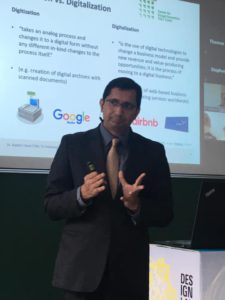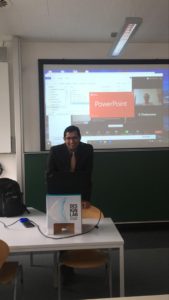On June 30, 2020 there was a Habilitation colloquium of Dr. Rajnish Tiwari that marked the successful completion of his Habilitation (“venia legendi”). The colloquium was on the theme of “Digital Transformation as Enabler of Affordable Excellence”. The presentation showed how digital technologies can help achieve frugal solutions that in turn enable affordable excellence.
Latest since the outbreak of the COVID-19 pandemic the potential of digital technologies as enabler of high-quality-yet-affordable solutions has become clear. Nevertheless, reports suggest that many firms struggle with implementing digital transformation due to the (perceived) need for high investments. Moreover, the true (potential) value-add of digital transformation is not clear to many, as digital transformation is often associated with complex terms such as “Industry 4.0”, “Internet of Things” or “Smart Homes”, whose true value-add is either not obvious to non-experts, or whose value-add is rather perceived in “nice-yet-superfluous” things such as a refrigerator which can autonomously re-order groceries. Thus, the cost-benefit analysis apparently does not seem to justify the requisite investments in many an instance.
The objective of this presentation is to discuss the potential and actual contribution of digital transformation to life-standard enhancing and life-saving solutions in an affordable and sustainable way that leads to greater social inclusion and helps resolve some of the most important global societal challenges.
The presentation (talk) consists of four parts. In the first part, the scope of the currently ongoing digital transformation and its relevance are defined. Digitalization has emerged as a “platform” that is built upon a number of “general purpose technologies” (GPT ), e.g. the Internet. Digital platforms make it possible for firms to disrupt the market. After establishing the scope and drivers of digital transformation, the second part defines a new approach to the term “affordable excellence” in the context of innovation management. The new approach calls for a multidimensional understanding of affordability that includes social justifiability, infrastructural reasonability, and environmental sustainability, in addition to financial tenability. In this view, excellence is not merely about maximizing technological performance, but rather about creating effective and context-specific solutions in a resource efficient manner.
), e.g. the Internet. Digital platforms make it possible for firms to disrupt the market. After establishing the scope and drivers of digital transformation, the second part defines a new approach to the term “affordable excellence” in the context of innovation management. The new approach calls for a multidimensional understanding of affordability that includes social justifiability, infrastructural reasonability, and environmental sustainability, in addition to financial tenability. In this view, excellence is not merely about maximizing technological performance, but rather about creating effective and context-specific solutions in a resource efficient manner.
Taking a closer look at select examples of digitally-enabled solutions that fit the criteria of affordable excellence, modes and routines of digitally-enabled affordable excellence are identified along six dimensions, i.e. Design & Development, Performance Features, Production, Distribution, Customer Orientation and Sustainability. While frugality and frugal innovation can be “vehicles” of affordable excellence, soft factors such as corporate culture and an empathetic mind-set form part of innovation pathways that lead to it.
The presentation concludes with a brief discussion of future outlook & avenues for further research.
